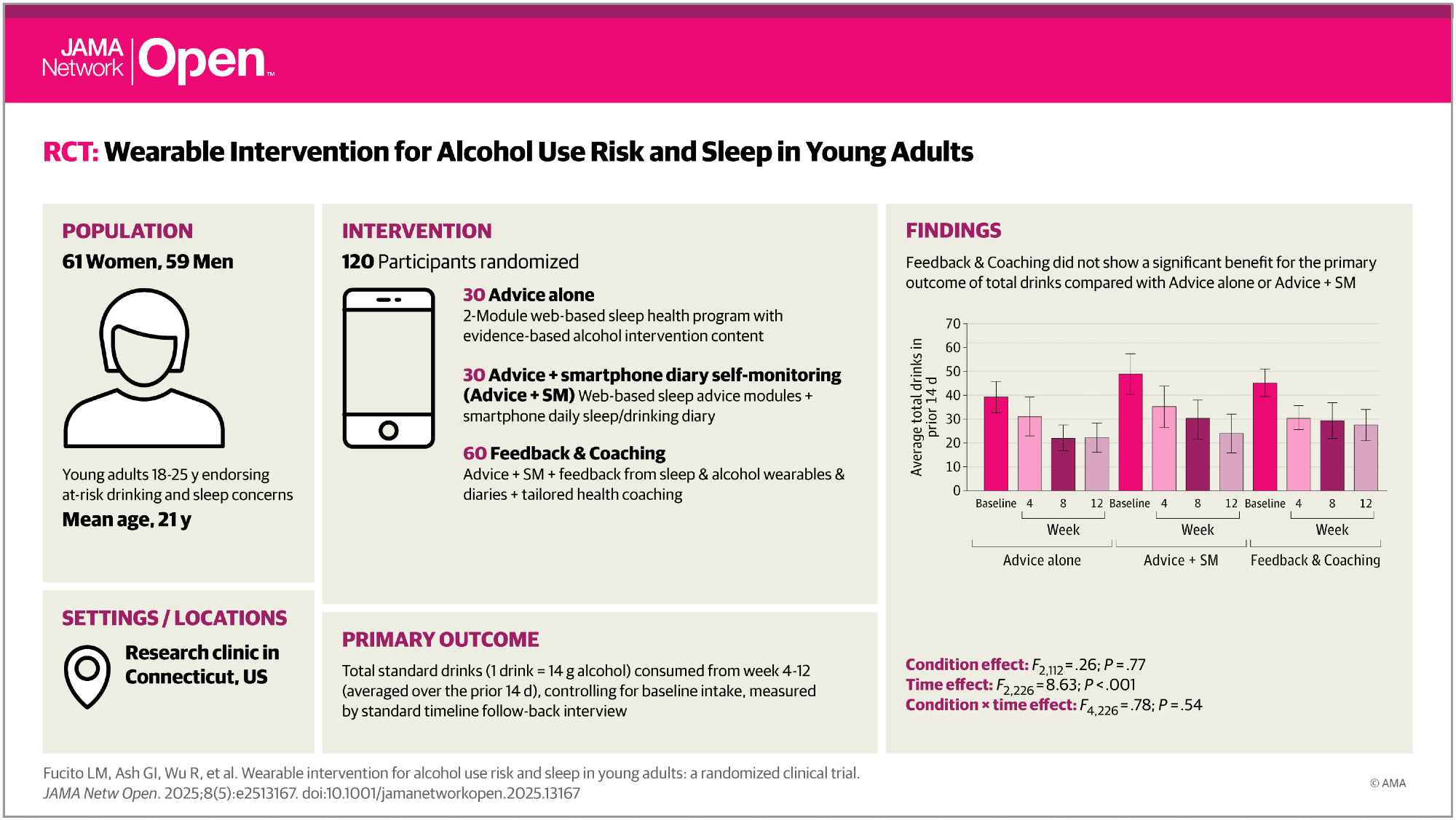Can smart wearables and personalized coaching boost sleep and lower risky drinking patterns in young adults? A Yale-led clinical trial offers hope for tech-driven health change.
 Study: Wearable Intervention for Alcohol Use Risk and Sleep in Young Adults
Study: Wearable Intervention for Alcohol Use Risk and Sleep in Young Adults
In a recent article published in JAMA Network Open, researchers examined the effectiveness of combining a wearable device, tailored coaching, and self-monitoring on drinking and sleep outcomes among young adult drinkers.
Background
Young adults are at elevated risk for alcohol misuse, making them a key group for prevention efforts. Digital tools, especially wearable devices, offer appealing, accessible options for behavior change, as young adults often seek anonymous and self-directed health support.
While digital alcohol interventions have shown only modest effects, incorporating wearables may enhance outcomes, particularly by providing real-time feedback and promoting self-monitoring.
Wearables have proven helpful in physical health domains like sleep and fitness, but their potential to change drinking behavior remains largely untested. Alcohol-sensing wearables can detect drinking via transdermal alcohol levels but have mainly been studied in justice settings. Wrist-worn devices now offer less invasive monitoring and are suitable for broader populations.
Interventions integrating multiple health domains, such as sleep and alcohol, are promising. Sleep disturbances are often linked with heavy drinking in young adults and may contribute to poor emotional regulation and increased craving.
Improving sleep may indirectly reduce alcohol use. Additionally, young adults who engage in risky drinking tend to be receptive to sleep-related interventions, which may help build awareness and motivation to change drinking behaviors.
About the study
This study tested a novel digital intervention that combined personalized feedback from wearables, coaching, and daily monitoring to reduce alcohol use and improve sleep for young adults.
The research team recruited 120 young adults between the ages of 18 and 25 with recent heavy drinking and sleep concerns. Participants were randomized in a 2:1:1 ratio into three groups.
The leading intervention group, comprising 60 participants, received wearable feedback, coaching, web-based sleep advice, and smartphone self-monitoring. The two control groups, consisting of 30 participants each, received web-based advice only, and the second received advice and self-monitoring. All participants wore sleep and alcohol biosensors for two weeks.
To be eligible for the study, participants had experienced at least three heavy drinking episodes in the two preceding weeks and a positive score on the Alcohol Use Disorders Identification Test.
People with sleep disorders, psychiatric illness, or current alcohol/sleep treatment were excluded. Randomization was stratified by sex and handled via a secure web-based system.
The intervention group had two virtual coaching sessions during the first two weeks. Doctorate-level coaches used motivational interviewing to discuss feedback from wearable and diary data.
Visualizations linked alcohol use with sleep disruption and estimated blood alcohol concentration during sleep. Coaches provided tailored behavioral strategies and supported goal setting.
Self-monitoring groups completed daily smartphone diaries of alcohol and sleep. The primary outcome was total drinks from the fourth to twelfth week. Secondary outcomes included sleep-related impairment, sleep disturbance, and alcohol-linked consequences.
An exploratory outcome investigating changes in the World Health Organization (WHO) score for drinking risk was also included. The WHO’s risk score ranges from 1 (the least risk drinking pattern) to 5 (the most).
Key Findings
Of the participants, 49% were men, and the mean age was 21. The individuals showed high adherence to daily diaries (95%) and wearable use (at least 95%). Nearly all participants completed the treatment and follow-up sessions.
For the primary outcome, all groups showed a significant decrease in total alcohol consumption over time, but there were no significant differences between intervention and control groups. Total drinking decreased by 31% and 49% from week 4 to weeks 8 and 12, respectively.
For the secondary outcomes, the intervention group reported significantly lower sleep daytime impairment compared to both control groups and lower sleep disturbance than the advice-only control group. The effect on the sleep disturbance was not significant when compared to the advice plus self-monitoring group, and the effect size was small.
Alcohol-related consequences decreased over time in all groups, but there was no significant difference between the intervention and control groups for secondary outcomes.
In exploratory analyses, the intervention group had significantly greater odds of reducing WHO alcohol risk levels at week 4 than the advice-only with a medium effect size. This finding was not a pre-specified primary or secondary outcome.
A reduction in sleep disturbance was significantly associated with a risk reduction, suggesting a possible link between improved sleep and reduced drinking risk.
Conclusions
This study found that while all participants reduced drinking over time, the digital intervention combining wearables and coaching showed modest benefits specifically for sleep-related daytime impairment and WHO alcohol risk-level reduction, but not for the primary drinking outcome.
High adherence and satisfaction support the feasibility of this approach, especially among young adults motivated by sleep improvement.
Strengths of this study include the novel repurposing of alcohol wearables, integration of multimodal data, a rigorous experimental design, and minimal missing data. However, limitations include a homogeneous sample, short follow-up, limited power for minor effects, and the subjective nature of outcomes.
The intervention shows potential for scalable health behavior change among young adults, particularly when addressing sleep and drinking together. Future trials should test longer, more diverse implementations and explore the integration of digital coaching and feedback across multiple health behaviors for broader public health impact.
Download your PDF copy now!
Journal reference:
- Wearable Intervention for Alcohol Use Risk and Sleep in Young Adults: A Randomized Clinical Trial. Fucito, L.M., Ash, G.I., Wu, R., Pittman, B., Barnett, N.P., Li, C.R., Redeker, N.S., O’Malley, S.S., DeMartini, K.S. JAMA Network Open (2025). DOI: 10.1001/jamanetworkopen.2025.1316 https://jamanetwork.com/journals/jamanetworkopen/fullarticle/2834652